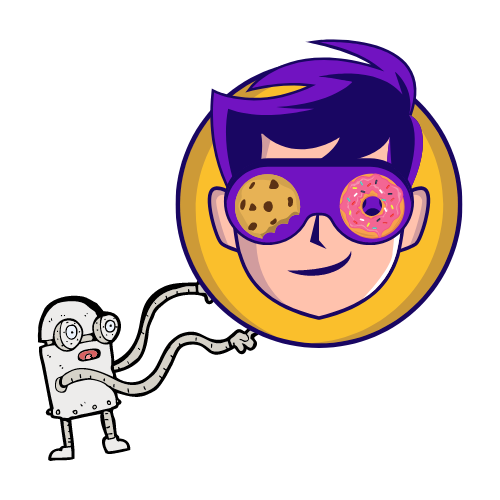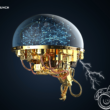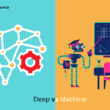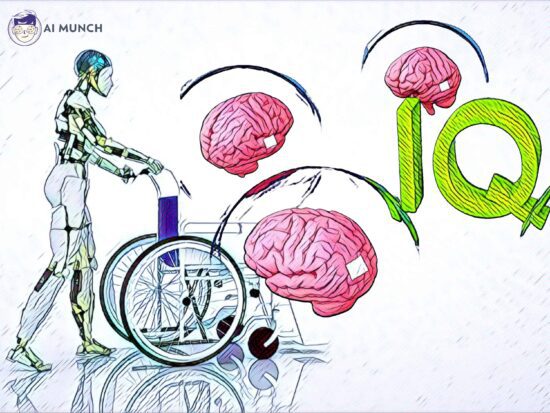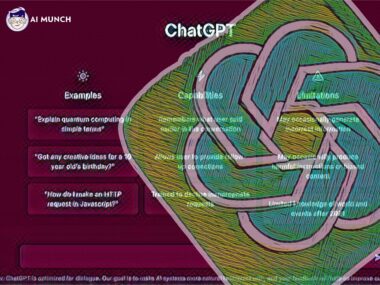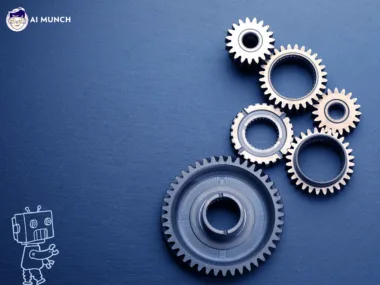Table of Contents Show
I. Introduction
The tech world is talking about artificial intelligence, while the Health sector is busy using AI in medicine. There are people who are worried about the impact of AI on human health. Are AI and human health connected? Lest start from the basics. The term “artificial intelligence” (AI) is often used to describe the study and use of computer systems that act like humans in areas like perception, speech recognition, making decisions, and translating languages. The ultimate goal of AI is to make people’s lives better and find answers to problems that can’t be solved any other way by making machines that are smart like people. This is why ‘AI and human health’ is a popular topic in the medical world. Even some folks are researching on “Artificial Intelligence vs Human Intelligence.”
A. Brief History of AI Development
Even Aristotle and Plato thought it might be possible to make machines that could think for themselves. Nonetheless, in the middle of the 20th century, AI research started to take shape, thanks to the introduction of digital computers and the growth of computer programming languages. Significant advances have been made in artificial intelligence (AI) over the past few decades, particularly in machine learning, deep learning, and natural language processing.
B. Importance of the Topic of Impact of AI on Human IQ Level
Artificial Intelligence vs Human Intelligence (AI vs HI) is the discussion which will never end. As AI develops, it permeates more areas of our lives, changing how we think about and interact with computers. Therefore, it is crucial to consider AI’s effect on human intelligence and how it may alter our cognitive abilities. This is an especially timely discussion, given AI’s impact on the economy, the job market, and other areas of human endeavor. By analyzing how AI affects IQ, we can learn more about this technology’s pros and cons and ensure it is being used responsibly and ethically.
II. Understanding IQ and its Measurement
A. Definition of IQ
The IQ test measures how smart a person is by how well they can memorize, comprehend, and apply information learned in the past. It’s a number that’s supposed to reflect how smart you are on average, and it’s used as a predictor of how far you’ll go in school and your career.
B. How IQ is Measured
Traditional IQ tests evaluate subjects’ verbal and nonverbal reasoning, memory, and perceptual skills among other cognitive abilities. The Stanford-Binet Intelligence Scale and the Wechsler Adult Intelligence Scale are the two most popular IQ tests. Various facets of cognitive ability are evaluated through a battery of questions and activities in these tests. The test’s output is a numeric score, with 100 as the mean and 15 as the standard deviation for intelligence.
C. Limitations of IQ Measurement
Although IQ testing is widely employed, it is not without caveats. Because the questions and tasks used in IQ tests are often based on Western cultural norms and values, this criticism is often levelled at the validity of IQ testing as a whole. Additionally, IQ tests may not indicate a person’s capacity for critical thinking, problem-solving, or creative thinking because they only measure a subset of intelligence. It is difficult to assess a person’s true intellectual ability with an IQ test because the test results can be affected by things like the test taker’s emotional state, motivation level, and socioeconomic background.
Overall, it’s important to remember that there are caveats to IQ testing and to think about other variables that could affect a person’s academic performance. When evaluating a person’s intelligence, it’s essential to take a more well-rounded approach than just looking at their IQ test results.
IQ scores and Intelligent Chart
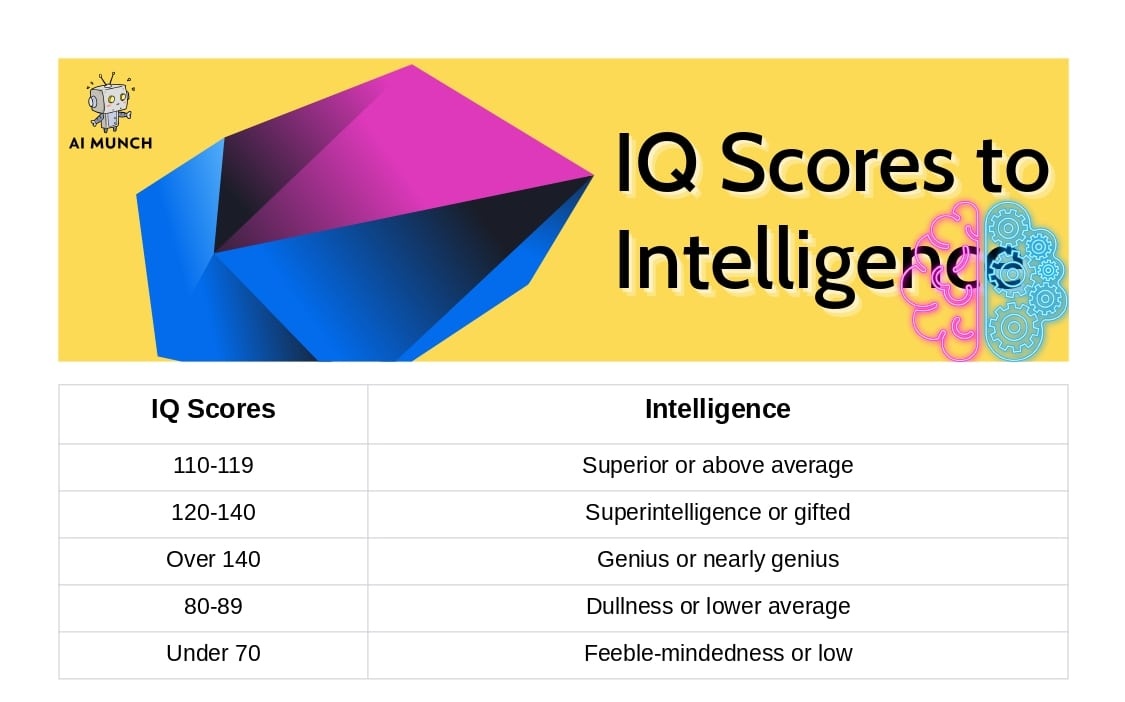
Average IQ – Classification Table
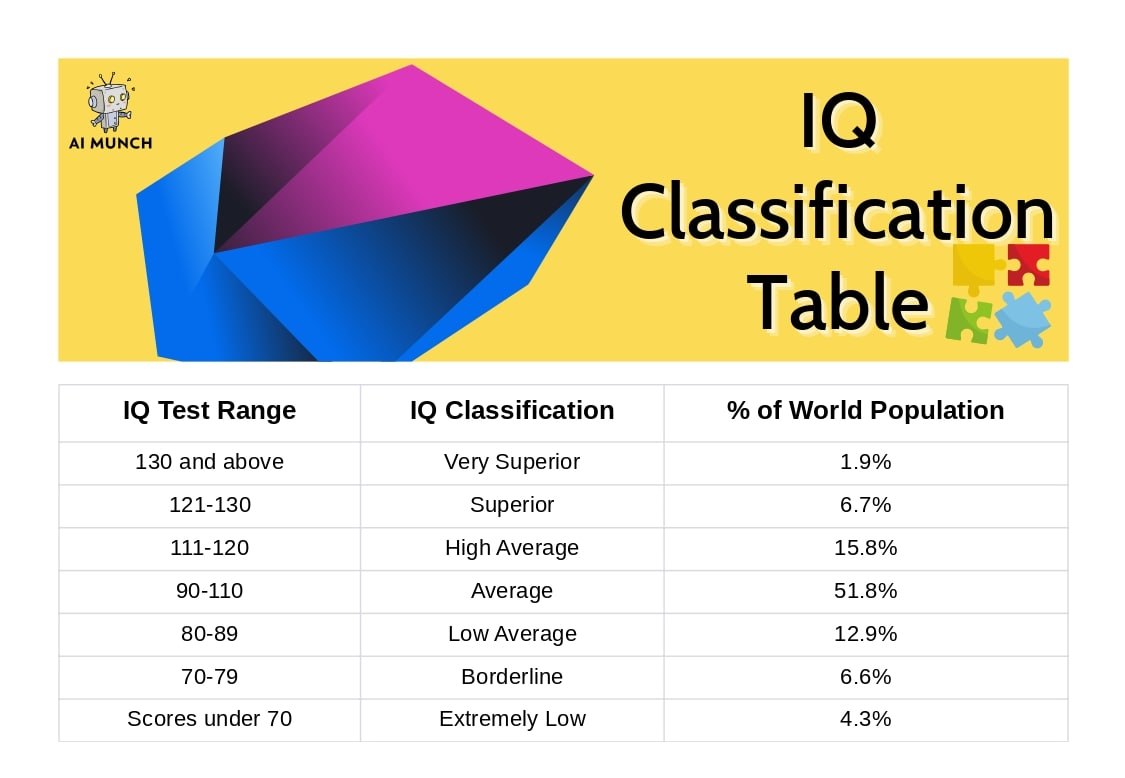
Average IQ score by Job
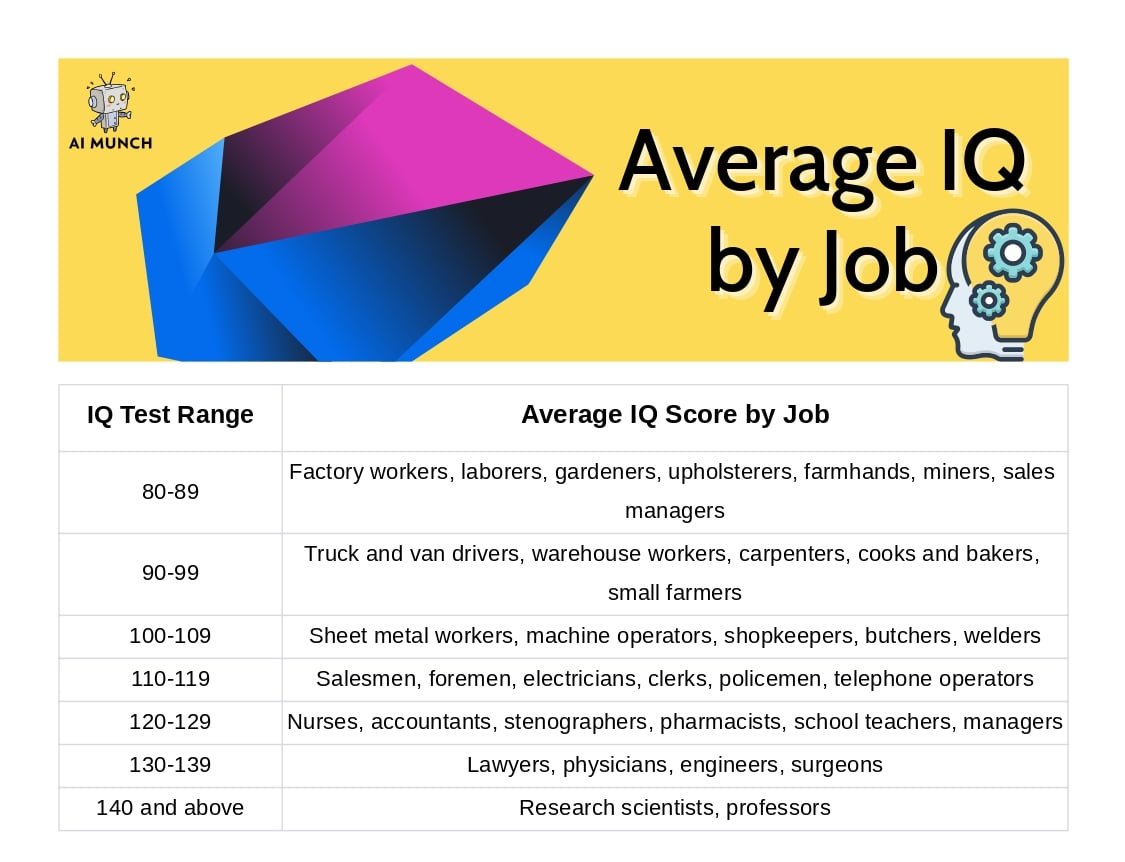
III. The Impact of AI on Human IQ
A. Positive Impacts
Improved Access to Information
We discussed the impact of AI on human health when we discussed the impact of AI on human society. One of the benefits of AI is that it makes it easier to get to data, which can have far-reaching effects. Search engines and virtual assistants that use artificial intelligence have made it simpler than ever to find and retrieve information quickly and accurately. Example: Google’s AI allows it to quickly and accurately index billions of web pages and return relevant results to users in real-time. This has resulted in a massive increase in the rate at which we can acquire new information and broaden our understanding of the world.
Enhanced Cognitive Skills
Of course, the impact of AI on human health can be positive, and this is the best example of that. AI also helps raise the average IQ of the people who use it by improving their cognitive skills. We can improve our ability to think and solve problems in some ways by using machine learning and AI algorithms. Playing strategy and quick-thinking video games, for example, has been linked to gains in cognitive performance measures like attention, working memory, and decision-making. In addition, we can hone our judgment and learn to make better choices with AI systems offering feedback and recommendations.
Increased Efficiency and Speed of Problem-Solving
Using AI systems has the potential to improve how quickly and effectively problems are solved significantly. Artificial intelligence systems, thanks to their ability to sift through mountains of data in search of patterns, have the potential to shed light on previously obscure topics and aid in the resolution of complex problems that would be impossible for humans to tackle alone. Many sectors, such as healthcare, finance, and transportation, stand to benefit significantly from this development.
B. Negative Impacts
Decreased Critical Thinking Skills
Artificial intelligence (AI) has the potential to improve many cognitive skills, but it could also make critical thinking less important. As we rely increasingly on AI systems to make decisions and solve problems, we will start to think less for ourselves and follow the AI’s lead too blindly. This may lower our IQ and make us less capable of abstract thought.
Dependence on AI for Decision Making
This is probably the main thing when we talk about the impact of AI on human health. This negative impact of AI makes us feel that it will replace humans. A possible reliance on AI for decision-making is another way in which AI can lower human intelligence. As AI systems get more innovative and more common in our daily lives, we may one day depend on them for important decisions like medical diagnoses, financial investments, and even criminal justice. As a result, we may become less confident in our judgment and more reliant on AI systems to make our choices.
Potential for Job Displacement
When we discussed AI effects, we studied this point from a different perspective. The fast growth of AI technology could cause significant changes in the economy and put a lot of people out of work. The World Economic Forum projects that by 2025, technology will generate 97 million new jobs while eliminating 85 million others. Since unemployed people may have a more challenging time finding new work, they may experience less cognitive stimulation and a decline in their intellectual abilities.
AI’s positive and negative effects on human intelligence are both possible and likely. Although AI could significantly improve our cognitive abilities, it could also lead to a decline in critical thinking, increased reliance on machines to make decisions, and lost jobs. Artificial intelligence will affect human intelligence, so we must use this technology responsibly and ethically.
IV. The Future of AI and its Impact on Human IQ
A. Advancements in AI Technology
Currently, the world is talking about OpenAI ChatGPT, Google LaMDA, and Google Bard AI. The fast growth of AI technology could significantly affect how intelligent people will be in the future. The development of machine learning, NLP, and CV has allowed AI systems to take on jobs once reserved for humans. For instance, in healthcare, AI systems are currently being developed to aid in diagnosis and treatment planning, which has the potential to vastly enhance patient outcomes while also reducing the burden on healthcare providers.
B. Potential Future Impact on Human IQ
The impact of AI on human health is quite a trendy topic. There is a lot of discussion among researchers about how AI will affect human intelligence in the future. As AI systems are used to improve our cognitive abilities and give us new insights into complex problems, some have speculated that this will lead to a significant increase in the average human IQ. Some worry that our IQ will decline as we rely more on AI systems to make decisions and solve problems.
C. The Role of Education in Preparing for the AI-driven Future
Most of the time, education is the best way to prepare for an AI-driven future and reduce any adverse effects on IQ. To keep up with the rapid development of AI systems, people must acquire the knowledge and abilities necessary to collaborate productively with these tools. Skills in critical thinking, problem-solving, and effective communication are included in this category, and technical proficiency. Individuals should also be able to critically evaluate AI’s recommendations and make well-informed choices based on that evaluation.
Finally, AI technology will profoundly impact our lives and our ability to think and solve problems, although the future of AI and its impact on human IQ is uncertain. Investing in education and training is crucial to prepare for this AI-driven future and use AI technology ethically and responsibly.
V. Artificial Intelligence vs Human Intelligence (AI vs HI)
Creating machines that can think and act like humans have been a long-standing vision, starting as science fiction but now becoming a reality. Incorporating intelligence into machines aims to make our work easier and more efficient. Today, we have a wide range of AI-powered devices, such as bots, humanoids, robots, and digital humans, that either outperform humans or work alongside us in various ways. These AI-driven applications have a high speed of execution, better operational ability, and accuracy, and they are better than humans at handling boring and repetitive tasks.
‘Artificial Intelligence vs Human Intelligence’ Who will win this war? Well, Human intelligence is a dynamic and adaptive process shaped by experience and learning. It does not rely solely on pre-fed data like AI; instead, it involves the integration of memories, emotional responses, and physical experiences. The human brain is much more complicated and smart than any machine, and machines can only copy its depth and layers for a short time. As technology improves, it will be interesting to see how machine intelligence changes over time compared to human intelligence. A timeline predicting the future of this comparison can provide us with a glimpse of what is yet to come.
VI. Conclusion
A. Summary of Key Points
The question of how artificial intelligence will affect people’s intelligence is nuanced and intricate. Artificial intelligence (AI) could help us solve problems more quickly and effectively and improve our ability to think. However, AI also has the potential to reduce people’s ability to think critically, make decisions independently, and even put people out of work. How artificial intelligence (AI) will change in the future and how it will affect human intelligence are still unknown. Still, education and training will be critical in ensuring any changes are for the better.
B. Final Thoughts on the Impact of AI on Human IQ
In conclusion, the topic of AI’s effect on human intelligence is crucial and merits further study and discussion. While AI holds great promise for boosting our mental capabilities, we must exercise caution when employing such technology and act ethically and responsibly. Investment in education and training can guarantee a bright future in which artificial intelligence (AI) positively affects human intelligence.
FAQs (Impact of AI on Human Health)
AI has the potential to be smarter than humans in some ways, like processing raw data and recognizing patterns. On the other hand, human intelligence is not limited to these specific skills. It also includes many emotional, creative, and social skills that AI systems can’t copy.
AI can make people more brilliant by improving our thinking skills and giving us new ways to look at complex problems. But the effects of AI on human intelligence are complicated and depend on how the technology is used.
AI has the potential to either help or hurt human intelligence, depending on how it is used. Artificial intelligence (AI) has the potential to raise the bar for human intelligence by giving people more opportunities to learn, making them more innovative, and helping them solve problems faster. But a person’s IQ can go down if they depend too much on AI to make decisions and lose the ability to think critically.
AI has the potential to be better at processing raw data and finding patterns than the human brain. On the other hand, the human brain has many emotional, creative, and social skills that AI systems can’t copy.
It is hard to say precisely when AI will be more intelligent than humans because it will depend on how fast AI technology improves and progress is made in this field. Some experts think this could happen in the next few decades, while others think it could take several hundred years or even longer.
Depending on how it is used, technology, including AI, can make people smarter and less smart. Even though technology can help us learn new things and make us smarter, relying on it to make decisions and losing the ability to think critically can make people less smart.
AI has the potential to process large amounts of data and find patterns much faster than the human brain. But the human brain has a wide range of skills and abilities that AI systems can’t copy, and speed isn’t the only way to measure intelligence.
Do you want to read more? Check out these articles.
